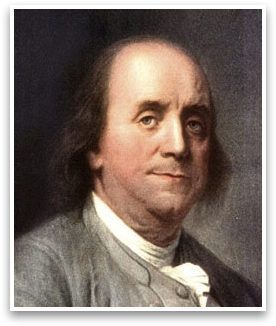
Benjamin Franklin
It is quite fitting that Benjamin Franklin was chosen to be the face of the $100 bill, given the wealth of advice this oft-misunderstood founding father offered us all in his famous "Poor Richard's Almanac." Franklin cherished the values of thrift, industry, and hard work, values that Americans are - at least in theory - supposed to cherish as well.
Franklin was a born capitalist, such to the point that he believed an astute businessman should assume whatever public persona was necessary in order to achieve maximum success. For all his faults (and he had many), Benjamin Franklin nevertheless stands to remind us all of the value of a mind well-ordered and life wholly dedicated to excellence.

Themes and Facts
- Apprenticed to his brother, a printer, as a youth, which was not surprising, given Franklin's natural love of books and reading.
- Was the author of Poor Richard's Almanac, extolling the virtues of thrift and hard work.
- A noted inventor (e.g. the Franklin stove, bifocals).
- Though critical of ecclesiastical authority, Franklin still accepted the basic premises of Deism (it is worth noting, however, that Franklin tagged human shortcomings as "errata" rather than "sins").
- Served as a diplomat as well as delegate to the Constitutional Convention.
Study Questions
- How is Benjamin Franklin a perfect American representative of Enlightenment thought?
- Although he never held elected office, Franklin is still considered an important "founding father." What values do you find in Franklin that are typically considered "American"?
- In a single sentence, summarize the essence of Franklin's philosophy in "The Way to Wealth."
- What would Benjamin Franklin think of current Americans' views of wealth and debt?
- For all their differences, what similarities do you see between Benjamin Franklin and Jonathan Edwards?
With his continued emphasis on personal industry and proper management of one's resources, Benjamin Franklin's admonition to "employ thy time well" is advice appropriate to all generations.